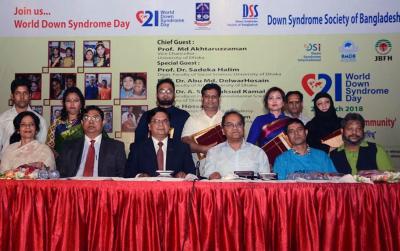DHAKA, March 23, 2018 (BSS) – Eight eminent persons and organisations have been given special honour this year for creating awareness about Down syndrome, a genetic disorder.
Three organisations which were given special honour in the institution category are Channel i, KAFCO and BSRM.
Five persons were given this honour in the individual category. They are: Vice-Chancellor of Chittagong Independent University Prof Mahfuzul Haque Chowdhury, former director of Japan Bangladesh Friendship Hospital Mahbubul Alam Babu (posthumous), Creative Director of RTV Syeda Munira Islam, Sub- Editor of Daily Kaler Kontho Ataur Rahman Kabul and Senior Reporter of Daily Independent Faisal Mahbub.
They were honoured at a function at Teachers-Students Centre of Dhaka University on March 21.
The Department of Communication Disorder of Dhaka University, the Down Syndrome Society of Bangladesh, the Japan-Bangladesh Friendship Hospital and AMDA Bangladesh jointly organised the function on the occasion of the 13th World Down Syndrome Day.
DU Vice-Chancellor Prof Dr M Akhtaruzzaman was present at the function as the chief guest, while Chairman of the Department of Communication Disorder Dr Hakim Arif presided over the function.
Dean of the Social Science Faculty of the university Prof Dr Sadeka Halim, Dean of the Arts Faculty Prof Dr M Abu Mohammad Delwar Hossain, Dean of Earth and Environmental Sciences Faculty Prof Dr ASM Maksud Kamal and Chairman of Down Syndrome Society of Bangladesh Dr Sardar A Nayeem spoke on the occasion.
Earlier, a colourful procession was brought out on the DU campus on the occasion of the 13th World Down Syndrome Day.
Down syndrome, also known as trisomy 21, is a genetic disorder caused by the presence of all or part of a third copy of chromosome 21. It is typically associated with physical growth delays, characteristic facial features and mild to moderate intellectual disability.
Down syndrome is one of the most common chromosome abnormalities in humans. It occurs in about one per 1,000 babies born each year.
In 2015, Down syndrome was present in 5.4 million individuals and resulted in 27,000 deaths, down from 43,000 deaths in 1990. There is no cure for Down syndrome. Education and proper care have been shown to improve quality of life.



